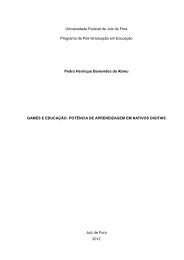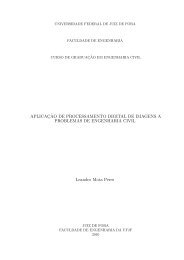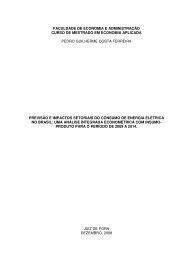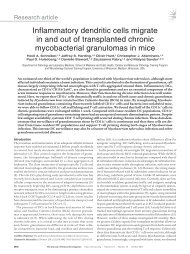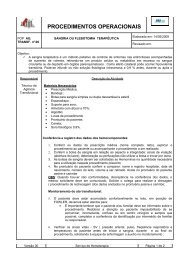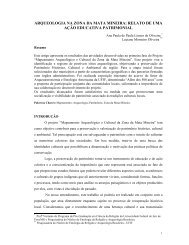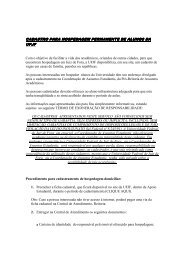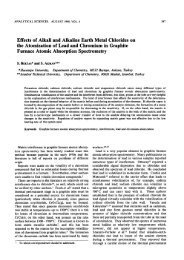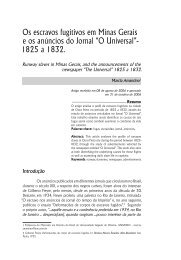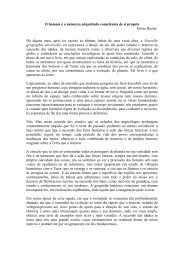Volume 6 | Número 2 Julho - Dezembro de 2012 - Universidade ...
Volume 6 | Número 2 Julho - Dezembro de 2012 - Universidade ...
Volume 6 | Número 2 Julho - Dezembro de 2012 - Universidade ...
You also want an ePaper? Increase the reach of your titles
YUMPU automatically turns print PDFs into web optimized ePapers that Google loves.
Psicologia em Pesquisa | UFJF | 6(02) | 151-159 | <strong>Julho</strong>-<strong>Dezembro</strong> <strong>de</strong> <strong>2012</strong><br />
infantil. Nesse sentido, torna-se ainda mais pertinente<br />
ampliar o escopo das investigações na realida<strong>de</strong><br />
nacional, visto que gran<strong>de</strong> parte do conhecimento<br />
científico <strong>de</strong>ssa área provém da literatura internacional.<br />
Referências<br />
Astington, J. W. (2004). The child’s discovery of the<br />
mind. Cambridge: Harvard University Press.<br />
Astington, J. W., & Jenkins, J. M. (1999). A<br />
longitudinal study of the relation between language<br />
and theory-of-mind <strong>de</strong>velopment. Developmental<br />
Pshychology, 35(5), 1311-1320.<br />
Ba<strong>de</strong>nes, L. V., Estevan, R. A. C., & Bacete, F. J.<br />
G. (2000). Theory of mind and peer rejection at<br />
school. Social Development, 9(3), 271-283.<br />
Banerjee, R., Watling, D., & Caputi, M. (2011).<br />
Peer relations and the un<strong>de</strong>rstanding of faux<br />
pas: longitudinal evi<strong>de</strong>nce for bidirectional<br />
associations. Child Development, 82, 1887-1905.<br />
Baron-Cohen, S. (2001). Theory of mind in normal<br />
<strong>de</strong>velopment and autism. Prisme, 34, 174-183.<br />
Baron-Cohen, S., Leslie, A. M., & Frith, U. (1985).<br />
Does the autistic child have a “theory of mind”?<br />
Cognition, 21(1), 37-46.<br />
Caputi, M., Lecce, S., Pagnin, A., & Banerjee, R.<br />
(<strong>2012</strong>). Longitudinal effects of theory of mind on<br />
later peer relations: the role of prosocial behavior.<br />
Developmental Psychology, 48(1), 257-270.<br />
Cassidy, K. H., Werner, R. S., Rourke M., Zubernis,<br />
L. S., & Balaraman, G. (2003). The relationship<br />
between psychological un<strong>de</strong>rstanding and positive<br />
social behaviors. Social Development, 12(2), 198-221.<br />
Cutting, A. L., & Dunn, J. (2006). Conversations with<br />
siblings and with friends: links between relationship<br />
quality and social un<strong>de</strong>rstanding. British Journal of<br />
Developmental Psychology, 24(1), 73-87.<br />
Denham, S. A., Caverly, S., Schmidt, M., Blair,<br />
K., DeMul<strong>de</strong>r, E., Caal, et al. (2002). Preschool<br />
un<strong>de</strong>rstanding of emotions: contributions to<br />
classroom anger and aggression. Journal of Child<br />
Psychology and Psychiatry, 43(7), 901-916.<br />
Dias, M. G. B. B. (1993). O <strong>de</strong>senvolvimento do<br />
conhecimento da criança sobre a mente. Psicologia:<br />
Teoria e Pesquisa, 9, 587-600.<br />
Dias, M. G. B. B., Soares, G. B., & Sá, T. P. (1994).<br />
Conhecimento sobre a mente e compreensão sobre<br />
as intenções do experimentador. Psicologia: Teoria e<br />
Pesquisa, 10, 221-229.<br />
Domingues, S. F. S., Valério, A., Panciera, S. D. P.,<br />
& Maluf, M. R. (2007). Tarefas <strong>de</strong> crença falsa<br />
na avaliação <strong>de</strong> atribuição <strong>de</strong> estados mentais <strong>de</strong><br />
crença. In P. W. Schelini (Org.), Alguns domínios<br />
da avaliação psicológica, (pp. 141-162). Campinas:<br />
Alínea.<br />
Dunn, J., Cutting, A. L., & Fisher, N. (2002). Old<br />
friends, new friends: predictors of children’s<br />
perspectives on their friends at school. Child<br />
Development, 73(2), 621-635.<br />
Flavell, J. H., Flavell, E. R., & Green, F. L. (1983).<br />
Development of the appearance – reality<br />
distinction. Cognitive Psychology, 15(1), 95-120.<br />
Flavell, J. H., Miller, P. H., & Miller, S. A. (1999).<br />
Desenvolvimento cognitivo. Porto Alegre: Artes<br />
Médicas.<br />
Fodor, J. (1986). La modularidad <strong>de</strong> la mente. Madrid:<br />
Editora Morata.<br />
Harris, P. L., Rosnay, M., & Pons, F. (2005). Language<br />
and children’s un<strong>de</strong>rstanding of mental states.<br />
Current Directions in Psychological Science, 14(1),<br />
69-73.<br />
Hughes, C., & Dunn, J. (1998). Un<strong>de</strong>rstanding<br />
mind and emotion un<strong>de</strong>rstanding: longitudinal<br />
associations with mental-state talk between<br />
young friends. Developmental Psychology, 34(5),<br />
1026-1037.<br />
Hughes, C., & Leekam, S. (2004). What are the<br />
links between theory of mind and social relations?<br />
Review, reflections and new directions for studies<br />
of typical and atypical <strong>de</strong>velopment. Social<br />
Development, 13(4), 590-619.<br />
Lyra, P., Roazzi, A., & Garvey, A. (2008). Emergência<br />
da teoria da mente em relações sociais. In T. M.<br />
Sperb & M. R. Maluf (Orgs.), Desenvolvimento<br />
sociocognitivo: estudos brasileiros sobre “teoria da<br />
mente”, (pp. 55-92). São Paulo: Vetor.<br />
Machado, P., Veríssimo, M., Torres, N., Peceguina,<br />
I., Santos, A. J., & Rolão, T. (2008). Relações<br />
entre o conhecimento das emoções, as<br />
competências académicas, as competências<br />
sociais e a aceitação entre pares. Análise<br />
Psicológica, 3, 463-478.<br />
Maguire, M. C., & Dunn, J. (1997). Friendships<br />
in early childhood, and social un<strong>de</strong>rstanding.<br />
International Journal of Behavioral Development,<br />
21(4), 669-686.<br />
Pavarini, G., & Souza, D. H. (2010). Teoria da mente,<br />
empatia e motivação pró-social em crianças pré-<br />
escolares. Psicologia em Estudo, 15(3), 613-622.<br />
Teoria da Mente e Desenvolvimento Infantil 158



